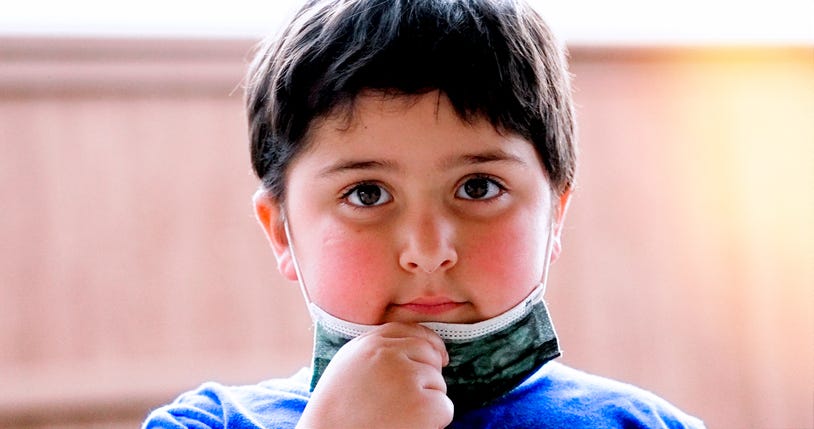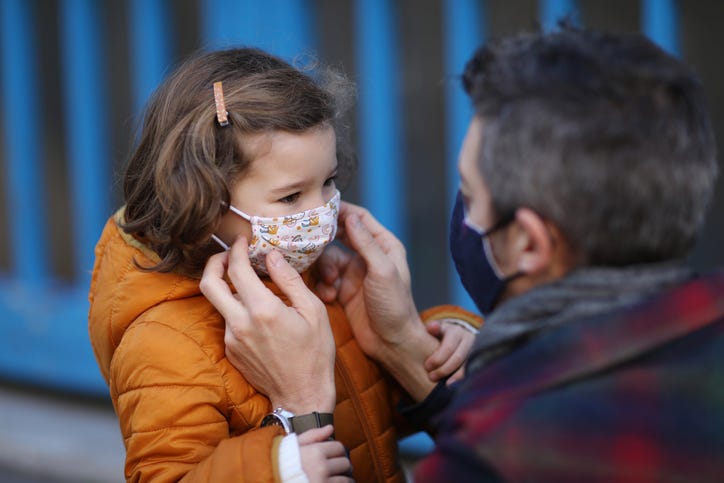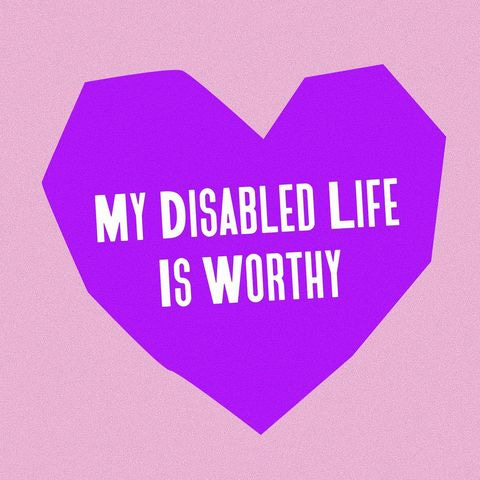We Need A Better Way To Talk To Kids About COVID-19
Because illness isn’t a moral failure and “doing everything right” has never been a guarantee of health.
Before we get into today’s essay, I need to tell you about a Very Cool Thing:
Burnt Toast is now an official sponsor of Me Little Me, an incredible feature film by Elizabeth Ayiku!
Me Little Me tells the story of Mya, a young Black woman who is fiercely pursuing a promotion at work while also attending an intensive out-patient treatment program for eating disorder recovery. Elizabeth’s work is powerful, important, and desperately needed: We do not hear nearly enough about the Black experience of eating disorders and eating disorder treatment.
Me Little Me is in postproduction and was just accepted into a high profile film festival that will give this story global exposure in the coming months. But first, Elizabeth needs to finish the film — and she needs to raise additional funds to get the film up to the festival’s technical standards. If you’re able to do so, please donate (scroll down to the bottom for the donation box). If everyone on this list gives just $3, we will fund this project today.
[If clicking on that video doesn’t play it correctly, click here, scroll down and press play.]
Using the power of Burnt Toast community to center and support other story tellers working in anti-diet/fat justice/eating disorder recovery spaces is a major goal of mine this year. I’d love your ideas on what else we can do — hit reply or post a comment below! And thank you for supporting Me Little Me (and independent anti-diet story telling, in all forms!).
We Need A Better Way To Talk To Kids About COVID-19

Vanessa’s 10-year-old tested positive for COVID-19 two days after Christmas, as they were visiting with grandparents and cousins. “We were all vaccinated and boosted if eligible and have taken every precaution and then some for the past two years,” she says. “He was absolutely distraught.” Her son felt terrible physically, with bad cold-like symptoms and a fever of 102, but Vanessa says his guilt and fear were even more intense. And then, one by one, a grandparent, a cousin, and Vanessa’s other son all tested positive as well. “Every time we got another result, he would burst into tears and say it was all his fault,” she reports.
Erin says her 5-year-old daughter responded to the news with fear and denial: “For two days she insisted the test had to be wrong.” Shauna says when her 10-year-old tested positive, “he worried he was the source of infection for his whole class.” And Jessica says she knew her 5-year-old would be so upset he was Covid-positive that they just didn’t tell him at all. “He never developed symptoms and we just didn’t want to mess with his head,” she explains. “We’ve spent two years ‘villianizing’ COVID-19 and he didn’t do anything wrong. We’ll tell him someday so he knows his medical history but right now, we don’t want him to be scared.”
For nearly the past two years, many of us with the privilege to do so have kept our families safe from COVID-19 by keeping our kids in masked, socially distanced bubbles. But now that we live in the Age of Omicron, the odds have become increasingly high that—despite all these precautions—either we or our kids are going to get it after all (or get it again, of course). As Melinda Wenner Moyer wrote last week, this shift requires an impossible set of mental gymnastics. “We’re being expected to transition seamlessly from ‘Let’s avoid getting Covid at all costs’ to ‘Now we're vaccinated and Omicron is milder so we're all just gonna get it and it'll be fine.’” she wrote. “That is not an easy emotional or cognitive transition to make and may not even be a transition we should make,” because there is so much we don’t know about how risky Omicron is, how it will impact kids (especially those too young to be vaccinated), and the role it will play in long Covid.
We can’t turn off our fear of these unknowns. But here’s what I do know: It’s time to untangle morality from health. For our kids and for ourselves.
I have written before about the role health-as-moral-virtue plays in fatphobia. Since we erroneously assume that people’s body size is both a measure of their health and exclusively determined by their personal choices, we code our anti-fatness into “but what about your health?” It feels okay to judge fat people if you think we are only fat because of our ignorance, or reckless behavior. Of course, this is about bias, not health, because if it was really about health, we would be more consistent in our scrutiny of reckless decision-making, as Ragen Chastain explained in our recent conversation:
When you go to a triathlon or when you watch the CrossFit Games and people have an exoskeleton of physio tape, that’s a lot of injuries that people don’t need to have in their lives, but they’re choosing that lifestyle. Shaq got knee surgery even though he for sure caused his knee problem and was going right back to the lifestyle that caused it.
The NFL was created to risk people’s short and long term mental and physical health in the hopes that one day their team will score enough points to get a shiny piece of jewelry. You’re allowed to do that, but let’s not act like it prioritizes health because it doesn’t. This is a whole group of people purposefully not prioritizing their health and the average player is broke by two years out of the league.
Health concern trolling with Covid plays out a little differently. For one thing, Covid is a clear-cut disease, and “ob*sity” is a body size that the medical establishment works hard to pathologize. For another, even when weight does impact health, it only impacts the health of the individual in question. Preventing infectious disease, on the other hand, requires a community effort; we cannot stop the spread if we don’t all agree to care about keeping each other safe. Instead, we’ve been politicizing Covid in both directions from the get-go, with Covid-deniers refusing to mask and vax, and liberals—me very much included—furious at the obvious immorality of choosing self over public good. I’ll just say it: I am not ready to stop being mad at white men (especially conservative white men) over the many ways they have prioritized capitalism over human lives. It is true that we can’t end the pandemic without individuals taking personal responsibility, but it is also true that we can’t end it without equitable access to testing, masks, vaccines, safe childcare, and paid time off.
And now Omicron means that personal responsibility really isn’t enough. You can do “everything right” and the odds are suddenly much, much higher that you’ll still catch it. You can do everything right and your kids can still catch it. And so now we have to start figuring out what to do with the guilt when that happens. When I asked Instagram followers for the stories above, I heard just as many, if not more, from mothers saying that a child testing positive inspired their own feelings of guilt that they didn’t do enough.

I’ve got priors when it comes to living with the guilt that you didn’t do enough to protect your child. After my older daughter survived a dozen surgeries related to a congenital heart condition, I spent two years in therapy untangling myself from the certainty that it was all my fault. And even after that work, some whisper of that same guilt has still shown up about once a week during the pandemic. It’s not as overwhelming anymore. Just a nice little trauma response of what if you missed a cough, what if her mask slipped, what if this playdate or that family gathering is the one we all live to regret.
There is a nasty tension here. Because any kind of health crisis, whether it’s the active type I experienced with my daughter, or the looming threat of one that we live with now, does involve a long to-do list of actions we must (or could, or should) take to help solve the problem, or at least, survive it. Healthcare mental load, and Covid mental load especially, means there are always things to research and buy and new therapies or treatments or routines to try. These tasks are important. They might genuinely help. And all of these tasks reinforce the understandable but ableist framing of health as simply a matter of willpower, which we see all the time in the discourse of disease. We talk about “beating cancer” and forget that this classifies anyone who dies as a loser. Kids with cardiac conditions are often called “heart warriors,” a term I hate because I don’t want my child to be a soldier in a war against her own body. We have to let go of the idea that sickness equals failure and remember that being able-bodied is the part that’s temporary.
We also have to remember that blaming people for their health never promotes health. Again, we see this in conversations around weight: When doctors and public health campaigns use shame or blame to discuss body size, people don’t lose weight, they internalize stigma. And, people often become less healthy as a result, thanks to both the mental health fallout of that stigma and the resulting avoidance and delay of seeking health care—if the system blames you, you stop seeking support from the system. And we’ve also seen this in previous pandemics, namely the AIDS epidemic of the 1980s, when President Reagan’s refusal to even say the word out loud normalized homophobia and entrenched the cultural stigma around sexually transmitted diseases for decades to come.
Because here’s the universal truth about health that we keep having to learn over and over: We don’t have as much control as we think. This is perhaps obviously true about something like a congenital heart condition nobody could have prevented. But it’s also true for weight-linked health issues, as we discuss here all the time. And it is true for Covid, especially now. From the beginning, we’ve tried to winnow down the list of people who get severely ill or die to “just the elderly,” or “just the disabled,” or “well, he was fat,” because it makes younger, more able-bodied, or thinner people feel like maybe the pandemic isn’t really happening to them.
This is a narrative reinforced by our public health messaging. CDC director Dr. Rochelle Walensky told Good Morning America on Friday: “The overwhelming number of deaths, over 75 percent, occurred in people who had at least four comorbidities. So really, these were people who were unwell to begin with. And yes, really encouraging news in the context of Omicron,” a statement that disability activists are rightfully labelling as ableist and eugenicist. The lives of “unwell to begin with” people are just as valuable as any other life. And we are approaching 1,000,000 dead in the United States. They weren’t all old, disabled, or fat. None of us are immune, even once we’ve been immunized.

This is not to say that N95s and vaccines and tests and boosters don’t matter. They matter so much. But precautions are not guarantees. And they do not signal our moral virtue —they signal our privilege. Right now, in the USA, it is people with privilege who are most able to access these tools. I’ve spent hundreds of dollars on N95s, KN94s, and rapid tests in the past month alone, and hundreds more on the fabric masks we wore before we had to upgrade. The ability to isolate, to work from home — even if it’s hell when your kids are home, too, even when it’s breaking us— is a privilege compared to the experiences of front line workers and their families.
What I’m arguing for here is different from the shrugging “welp, guess it’s inevitable now” approach gaining traction on social media right now. This should never have been inevitable and the fact that it feels that way is terrifying. We shouldn’t chicken pox party with Omicron and we should keep taking precautions during this surge. If it’s possible to delay or prevent infection, we should try to do it. But we can take on those personal responsibilities in an effort to protect ourselves and others without accepting the blame if they don’t work. If they don’t work, it’s not because we weren’t perfect enough or worthy enough. It’s because we were plunged into this pandemic and led by a tyrant who refused to accept science. And because, even now, with ostensibly pro-science leadership at the helm, we are seeing key public health plays fumbled in the name of economics and political capital.
So we have to start reframing this conversation for our kids, who have had the least control, who have been asked repeatedly to do things that would have sounded unthinkable in February 2020, who have been relying on adults to steer this ship the whole time. We need to model for them what it means to have more okayness and less blame with the diagnosis if, or increasingly when, it happens. We need to explain that being sick isn’t a personal failure and that our health isn’t always something we can control.
Shauna’s 10-year-old was able to turn his experience getting sick into something productive: “He’s now talking down his own friends who think the vaccine will turn them into actual zombies,” she says with a sigh. And, in a weird way, Vanessa says, our current unnerving reality is the thing that’s finally helping to ease her son’s guilt: “The tidal wave of Omicron taking over everywhere has normalized what happened to him,” she says. It’s time to normalize it for ourselves too.





The Age of Omicron and the “everyone will get it now” sentiment has been hitting me hard this week. After two years of worry and sacrifice, especially parenting in isolation while trying to protect a not-yet-vaccinated small child, it’s all feeling…pointless? I’m not sure how to take the “appropriate” level of responsibility—what does it mean to take precautions without assuming (the illusion of) control? Sigh. It feels unacceptable that we’re still in this mode of constant risk assessment and mitigation, on top of the general mental load of motherhood that was already unsustainable. Anyway, thanks for writing this and providing space to process. This framework that decouples health from morality connects a lot of dots between COVID, disability, chronic illness, fatphobia, etc. and that is important and helpful work, especially for us parents.
Loved this. Also perfect timing. Just yesterday my kid came home and said [redacted] said something mean to me. So I asked what he said and it was “paper masks zap germs but cloth masks let the germs in.” She felt like he was insulting her because she had on a cloth mask (because 1) she is sensitive to textures and we haven't found a disposable one that fits properly yet, and 2) I've ordered a few more different kinds of disposable masks that haven't yet arrived.) I'm not even sure what to make of this, but I hate it.